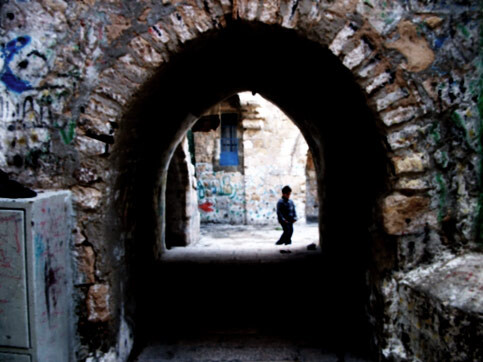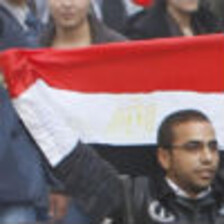Ottawa 14 August 2009

The Muslim quarter of Jerusalem’s Old City. (Maureen Clare Murphy)
There are stairs, which descend from Jaffa Gate to another world. When I first saw these stairs, I thought them to be a meeting point — something like the stairs that descend from the main road to Damascus Gate. But these stairs give onto a promenade of stores and cafes and commercial outlets of all sorts. In such stark contrast is this promenade to the Old City, which it leaves behind, that it literally feels surreal. But the Alice in Wonderland phenomenon only intensifies as one proceeds further down the rabbit hole.
Tired and aching from a day of walking through the Old City, I stumbled through the pedestrian mall, like a weary traveler, estranged from the very same commercial outlets that I see every day back in my own country. Rolex, coffee shops, clothing stores, Crocs shoe store — all of these things should embrace me with a kind of familiarity that the nurturing hand of commercial culture does all around the world. And yet, it is strangely eerie because I cannot fathom how I have made the jump from Jerusalem to Europe in a matter of seconds. Nothing seems the same, but I was only moments ago in the throes of oldness and twisting markets of the Old City.
As I emerge from the other side of the underpass, the New World opens up. Billboards, busy streets, a hot dog shop called Doggy Style. I lose track of the fact that now signs are routinely in English. I start to feel more at home in a sense, but strangely disassociated. People mill about animatedly like they would in any large European city — waiting to go to the hot night spots and dressed to the nines, or just waiting to sit on a patio and have some drinks with friends. The unmistakable obnoxious voice of an American tourist pipes up as he is in the middle of recounting a story or a joke — I don’t know which. The scene is so familiar and yet with every moment I become more and more on edge.
And then it hits me as I return back through the same rabbit hole, I am constantly judging the face and hair and clothes of every person I meet. I am looking for the
And a young woman passes me by wearing a kuffiyeh (the traditional Palestinian checkered scarf) around her neck. I am naively worried for her safety here. And we see no police or army anywhere. Where did they all go? — as rampant as they were in the Old City, they are completely absent here, except for an unarmed young woman in army greens walking with her friend in the mall. In the Old City I constantly apologize for not speaking a word of Arabic. People search for their English, but by and large they need to drag a friend over to translate or provide one or two words that could be of assistance. The Muslim quarter of the Old City is not my home and yet it is much more my home than this.
Or maybe I am just wary that given enough time, given the time to normalize into this looking glass world, I will transform myself. Much like the settler colony where we live in Canada, I will invent a rationale to explain the light rail transit tracks leading from the settlements on the outskirts to the city center of Jerusalem. Everything would have an explanation and the palliative of conscience, the soothing hand of convenience would reassure me that all these people are not so bad. That they are just waiting for their friends, hanging in the mall, going on a family outing or just relaxing on a Saturday night. To be sure, they are doing all of these things, but knowing what they know — knowing that their army and police are patrolling the city only blocks away, what do they think about the very foundation of their world?
All new world foundations are fucked up in a way, but this disjuncture between the base and the superstructure, the building blocks of society is so glaringly obvious. You have to be willfully blind not to see it. Not to see that there is an obvious asymmetry that keeps people down and disenfranchised. I am reminded of the invisible exclusions that permeate Canadian society and wonder at my disdain for this society. Perhaps it is possible to be allied with the cause of struggle in every society — there just as here. But to the extent that we knowingly or unknowingly participate in the economy of the oppressors, does make us complicit in a sense. I think of Mohammed Khatib’s words, from the popular resistance movement against Israel’s wall in the Palestinian village of Bilin, and try to take the good from the bad.
But I wonder where the good resides, when it seems that there is neither good nor bad, but merely indifference here.
Yavar Hameed is a human rights lawyer based in Ottawa, Canada and sessional lecturer at Carleton University. He visited Israel/Palestine for a week in late July 2009.

